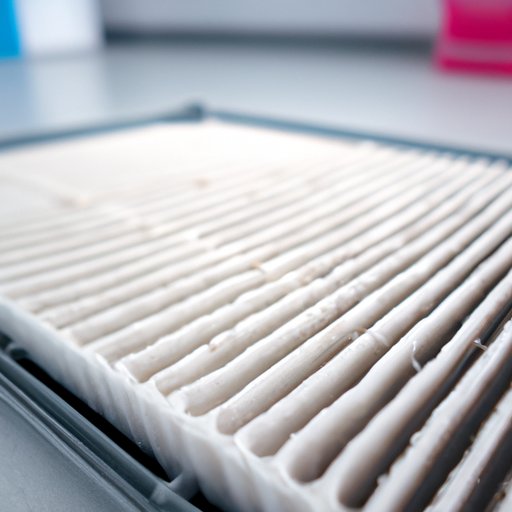Introduction
HEPA filters have been making headlines and have become a symbol of good indoor air quality. These filters are designed to remove tiny airborne particles such as dust, mold spores, and bacteria. The main purpose of this article is to educate readers about HEPA filters and why they are essential to one’s health. Indoor air quality may not be something you think about every day, but it’s vital to maintaining good health.
Clearing the Air: Understanding the Inner Workings of HEPA Filters
High-Efficiency Particulate Air (HEPA) filters have been around since the 1940s. These filters were initially developed to protect workers from hazardous airborne particles during the Manhattan Project. Since then, HEPA filters have become an essential part of hospital-grade air filtration systems.
HEPA filters are made up of a thick layer of fine mesh, usually made from fiberglass, that traps airborne particles as air passes through. The filter may also contain an activated carbon component, which is designed to absorb odors and chemicals.
A key feature of HEPA filters is their ability to remove tiny particles from the air. These filters can capture particles as small as 0.3 microns in size, which is smaller than the eye can see. To put that in perspective, a strand of human hair is about 100 microns in size.
Breath Easy: The Science Behind HEPA Technology
HEPA filters are rated based on their efficiency at capturing particles. The efficiency rating is determined by the percentage of particles of a particular size that the filter can capture. For example, a HEPA filter with an efficiency rating of 99.97% means that the filter can capture 99.97% of particles that are 0.3 microns in size.
Other types of air filters, such as electrostatic and activated carbon filters, work by attracting and adsorbing particles. However, these filters are not as effective at capturing tiny particles as HEPA filters.
Using a HEPA filter can have many benefits, including reducing allergens in your home and improving sleep quality. Research has shown that HEPA filters can be particularly beneficial for people with respiratory issues, such as asthma and allergies. These filters have also been shown to reduce the risk of inhaling airborne viruses and bacteria.
HEPA Filters 101: How They Capture and Remove Indoor Air Pollutants
Indoor air pollutants come in many forms and can occur in any environment. Common indoor air pollutants include dust, pollen, pet dander, and mold spores. These pollutants can cause a range of health issues, from headaches to respiratory problems.
When air passes through a HEPA filter, the filter traps the particles and prevents them from circulating back into the air. The particles become trapped in the filter’s fibers, and over time, the filter becomes clogged with the captured particles.
While HEPA filters can capture many types of pollutants, they are not effective at capturing gases and odors. This is where activated carbon filters come in, which are designed to adsorb and neutralize odors and chemicals.
Revolutionizing Indoor Air Quality: The HEPA Filter Explained
The use of HEPA filters has revolutionized indoor air quality over the years. In the past, air purification technology was not advanced enough to capture tiny airborne particles effectively.
Today, HEPA filters have become a common feature in home and office air purifiers. These filters have become an essential component in providing high-quality air filtration for those who need it. For people with allergies or respiratory issues, HEPA filters have been a game-changer in improving their quality of life.
The Ultimate Guide to HEPA Filters: Benefits, Uses and Mechanics
There are different types of HEPA filters, and each is designed for a specific purpose. Some filters are designed for residential use, while others are designed for industrial applications. Each type of filter has its own unique features and benefits.
It’s crucial to maintain your HEPA filter to ensure it continues to work effectively. Over time, the filter will become clogged with captured particles and become less effective. Regularly replacing your HEPA filter can help keep your indoor air quality at optimal levels.
How HEPA Filters Work and Why They Are Essential to Your Health
HEPA filters are essential to maintaining good health, particularly for people with allergies or respiratory issues. These filters capture tiny particles, including viruses and bacteria, that can cause illness and exacerbate existing health conditions. HEPA filters are also effective at reducing indoor air pollution, which can be beneficial for everyone, regardless of their health status.
The environments in which HEPA filters are essential include hospitals, laboratories, and other places where hazardous airborne particles are present. However, these filters can also be beneficial in homes and offices, where indoor air pollutants are often present.
Conclusion
Indoor air quality is an often-overlooked aspect of maintaining good health. However, with the use of HEPA filters, it’s possible to improve the quality of the air we breathe. HEPA filters capture tiny airborne particles, including allergens and viruses, that can cause illness and exacerbate existing health conditions.
To enjoy the benefits of HEPA filters, it’s essential to maintain them properly. Regular replacement of your filter will ensure that your air purifier continues to work effectively.
If you’re looking to improve your indoor air quality, consider using a HEPA filter in your home or workplace. With regular maintenance and upkeep, your filter can help you breathe easier and maintain good health.
(Note: Is this article not meeting your expectations? Do you have knowledge or insights to share? Unlock new opportunities and expand your reach by joining our authors team. Click Registration to join us and share your expertise with our readers.)
